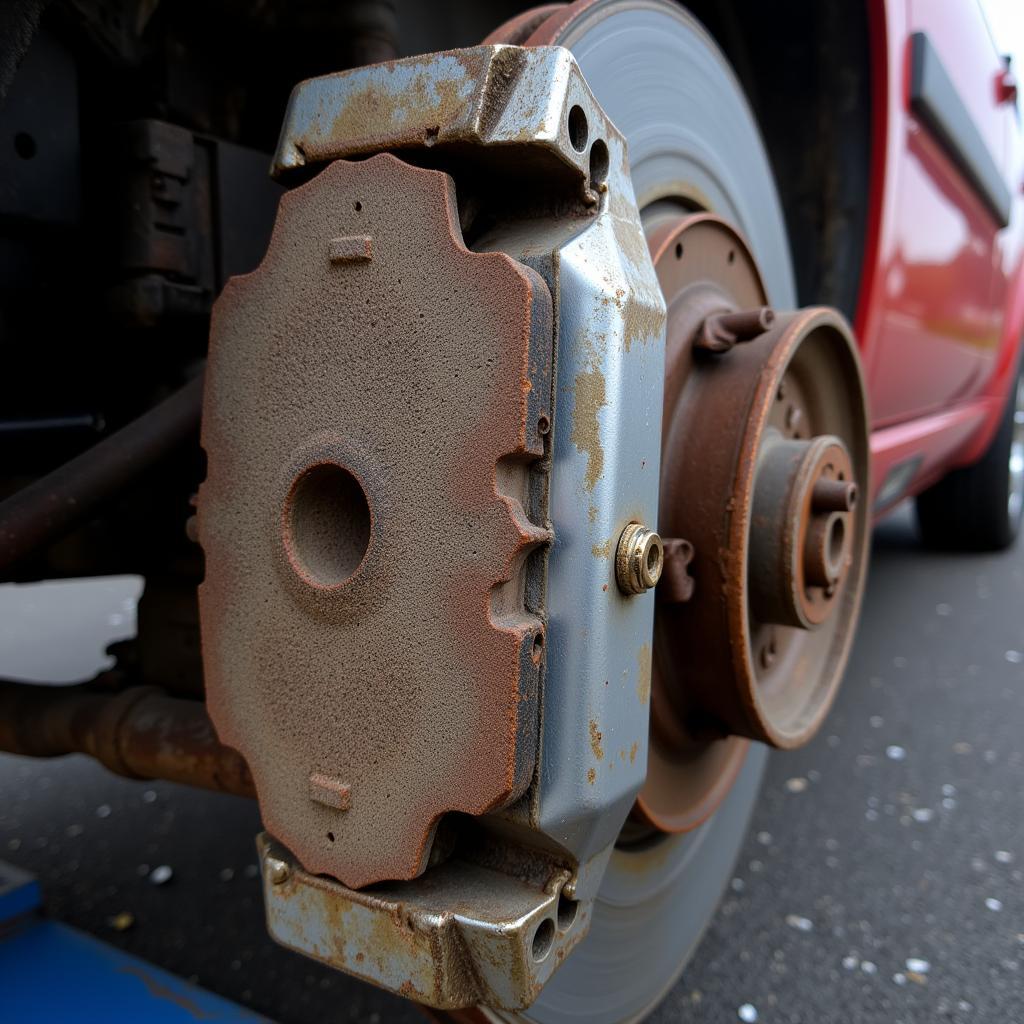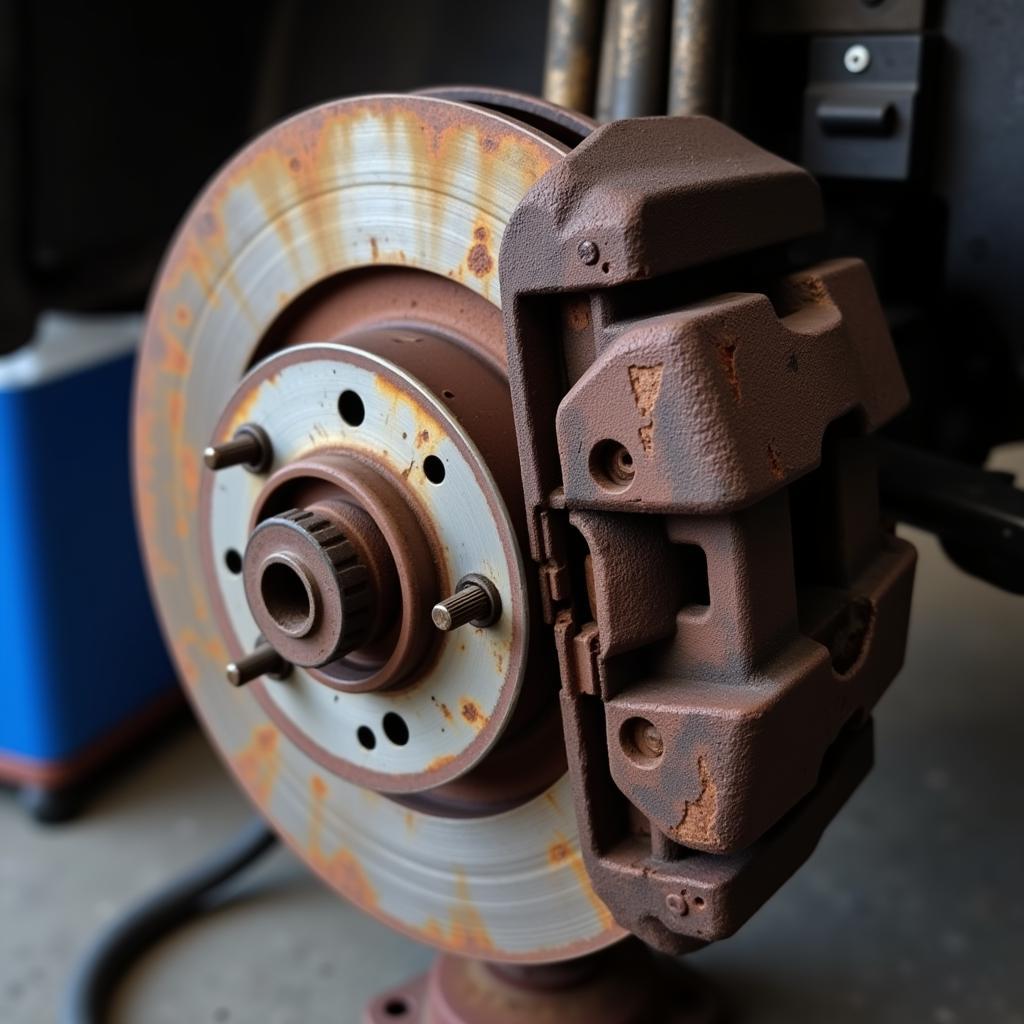Have you noticed your car making strange noises when you brake, or is it taking longer to stop? You’re not alone. Brake problems are one of the most common issues car owners face. These problems can range from minor inconveniences to major safety hazards, so it’s crucial to address them promptly. This comprehensive guide will delve into common brake problems, their causes, symptoms, and solutions, empowering you to take action and keep your car safe on the road.
Common Brake Problems in Cars
Understanding the common Brake Problems In Cars is essential for any car owner. These issues can range from minor inconveniences to serious safety risks. Here are some of the most frequently encountered problems:
1. Worn Brake Pads
Worn brake pads are one of the most frequent brake problems encountered in cars. As you apply the brakes, the brake pads press against the rotors, creating friction that slows the car down. Over time, the friction wears down the brake pads, causing them to become thinner. This is a normal process and eventually, the brake pads will need to be replaced.
Symptoms of worn brake pads:
- Squealing or grinding noises when braking. This is a common symptom of worn brake pads.
- Vibrating brake pedal. As the brake pads wear down, they can become uneven, causing the brake pedal to vibrate.
- Increased braking distance. If your car takes longer to stop than usual, worn brake pads could be the culprit.
- A low brake pad warning light on your dashboard. Some vehicles have a sensor that will light up on your dashboard when your brake pads are getting close to needing replacement.
Solution: Replace the brake pads.
 Worn brake pads on a car
Worn brake pads on a car
2. Warped Brake Rotors
Brake rotors are the metal discs that the brake pads press against. Over time, they can become warped due to heat or other factors. Warped rotors can cause a vibration in the brake pedal when you brake.
Symptoms of warped brake rotors:
- Vibrating brake pedal. This is the most common symptom of warped brake rotors.
- A pulsating feeling in the brake pedal. You may feel a pulsing or throbbing in the brake pedal when you apply the brakes.
- Grinding noise when braking.
Solution: Replace or resurface the brake rotors.
3. Faulty Brake Calipers
The brake calipers hold the brake pads against the brake rotors. If the calipers fail, the brake pads won’t be able to properly engage, and your brakes may not work correctly.
Symptoms of faulty brake calipers:
- Brake pedal feels soft. This is often a sign of a faulty brake caliper.
- Car pulls to one side when braking. This can be a sign of a brake caliper that is stuck on one side.
- Brakes overheat. This can be a symptom of a brake caliper that is not releasing properly.
Solution: Replace the faulty brake calipers.
 A faulty brake caliper on a car
A faulty brake caliper on a car
4. Leaking Brake Fluid
Brake fluid is a hydraulic fluid that helps to transfer pressure from the brake pedal to the calipers. Over time, brake fluid can leak from the brake lines or other components.
Symptoms of leaking brake fluid:
- Low brake fluid level. Check your brake fluid reservoir regularly.
- Spilled brake fluid on the ground. Look for brake fluid leaks on the ground underneath your car.
- Soft brake pedal. This is a common sign of low brake fluid levels.
- Squealing or grinding noises when braking. This could be due to brake pads being exposed due to a low brake fluid level.
Solution: Repair the leaking brake lines or components and replenish the brake fluid.
5. ABS Problems
ABS (Anti-lock Braking System) is a safety feature that prevents the wheels from locking up during braking. If your ABS system malfunctions, it can affect your ability to stop safely.
Symptoms of ABS problems:
- ABS warning light on your dashboard.
- ABS system doesn’t activate.
- A grinding or clunking noise when braking.
Solution: Have your ABS system inspected and repaired by a qualified mechanic.
How to Prevent Brake Problems
You can help to prevent brake problems by following these tips:
- Check your brake fluid level regularly. The brake fluid reservoir is typically located under the hood.
- Have your brakes inspected regularly. This includes checking the brake pads, rotors, calipers, and lines.
- Don’t wait until your brakes are making noise. If you hear any unusual noises when braking, have your brakes inspected immediately.
- Avoid hard braking. Hard braking puts a lot of stress on your brakes.
- Don’t overload your car. Overloading your car can put extra stress on your brakes.
Conclusion
Brake problems can be a serious safety hazard, but with proper maintenance and attention to symptoms, you can keep your car’s brakes in good working order. Regular inspections and timely repairs can help prevent major issues and ensure that your brakes function properly. If you experience any of the symptoms mentioned above, don’t hesitate to contact a qualified mechanic for a thorough inspection and repair.
Contact AutoTipPro for reliable and expert brake repair services. Our team of experienced technicians is ready to diagnose and address any brake issues your vehicle may have.
Phone: +1 (641) 206-8880
Office: 500 N St Mary’s St, San Antonio, TX 78205, United States
FAQ
Q: How often should I get my brakes inspected?
A: It’s recommended to have your brakes inspected every 6 months or 5,000 miles.
Q: How long do brake pads last?
A: The lifespan of brake pads varies depending on driving habits, vehicle type, and brake pad quality. Generally, they can last between 20,000 and 40,000 miles.
Q: Can I replace my own brake pads?
A: While some car owners may be able to replace their own brake pads, it’s generally recommended to have a qualified mechanic perform the task. Replacing brake pads improperly can be dangerous and lead to further brake problems.
Q: How much does it cost to replace brake pads?
A: The cost of replacing brake pads varies depending on the make and model of your vehicle, as well as the type of brake pads you choose. It’s best to contact your local mechanic for an estimate.
Q: Can I drive my car with worn brake pads?
A: It’s not recommended to drive your car with worn brake pads. Driving with worn brake pads can lead to increased braking distances, which can increase your risk of an accident.





Leave a Reply